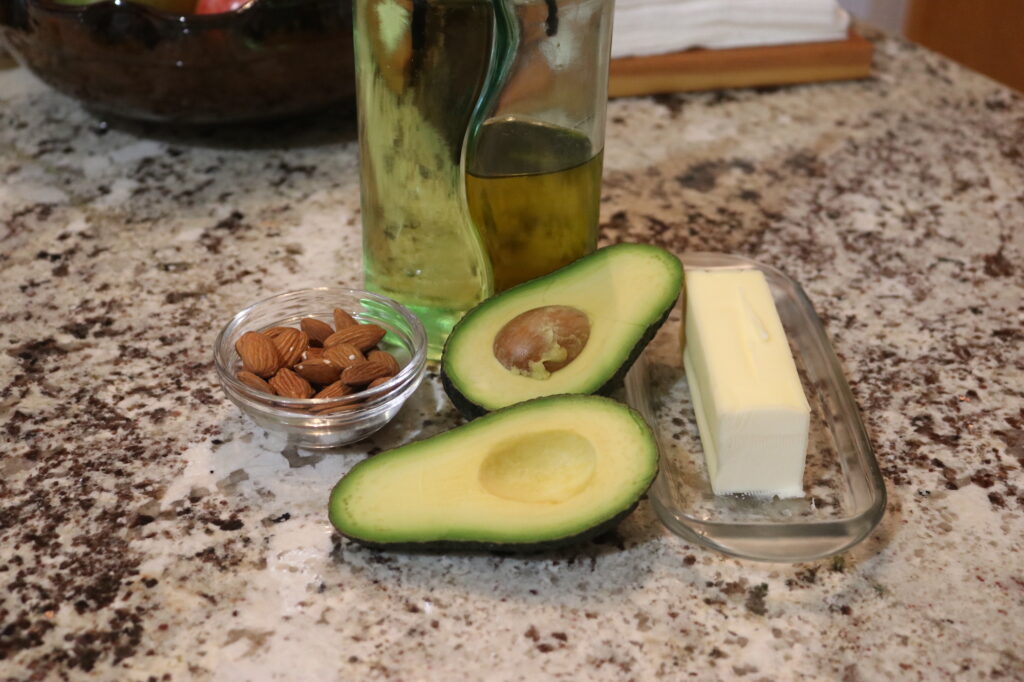Fats, fats, fats. Don’t cringe. There are lots of benefits of fat in our diet. I know, fats have really gotten a bad reputation over the last 30 years especially in the diet community. The word “fat” sometimes feels like a curse word in my sessions. Let’s start with an obvious one- fat in our food is not the same as fat on our bodies. When you eat a teaspoon of butter, you are not adding a layer of fat to your thighs. It just doesn’t work like that.
After my balanced eating post, I wanted to follow up with a series of posts going into more detail about each of the food groups. Of course, I wanted to cover fats first since I think it is the most challenging food group to discuss in sessions since I get so many questions about why they are necessary, why they shouldn’t be cut out completely and whether they make people fat.
What do dietary fats do for us?
- Taste: fats add flavor to our meals and snacks. I would say this is the most important part of dietary fats (who likes to eat a dry piece of bread?)
- Satiety: fat in our meals can help us feel fuller longer and more satisfied with the meal
- Fat-Soluble Vitamins: fats are essential for the absorption of some vitamins such as A, D and E from our food.
- Bodily functions: provide energy, support cell function, aid in hormone production.
Different types of fats
While I don’t like to refer to them as “good” and “bad”, I can recognize that there are some that should be eaten more in moderation than others. There are two types of fats that are differentiated because of their chemical structure and physical properties.
- Saturated fats: Fats that tend to be more solid at room temperature and are mainly found in animal products. Examples of foods with saturated fat: beef, pork, butter, margarine, cheese, cream cheese and processed foods such as fast foods, baked goods, pizza.
- Unsaturated fats: These fats can be found in foods such as oils, nuts, seeds, avocados and fish.
Thirty years ago, we were told fats are bad for us but over the years, more and more research has come out showing that while some fats (saturated) need to be eaten in moderation, other fats (unsaturated) actually have proven health benefits!
So, where does this leave us with fats?
I always come back to the saying “Everything is ok in moderation”. The diet community has so many people wrapped up in “no fat”, “low fat”, or “fat is bad”. First of all, a “no fat” diet would be almost impossible to follow and I would argue an unhealthy one. Second, the quality of the fat is just as important, if not more, than the quantity. For me, I love butter and I’m not going to cut it out because it’s a saturated fat, but I do have it in moderation. I also love avocados and tend to eat them more freely since they have lots of health benefits.
This post is not intended to replace any medical advice you have received from a health practitioner. If your practitioner has told you to stop eating butter, then by all means. This post is aimed more for those who may be navigating diet messages or guilty feelings around whether fats are bad for us or whether you should eat that piece of bread plain and dry or add the avocado!
References:
“Dietary Fats.” American Heart Association.
https://www.heart.org/en/healthy-living/healthy-eating/eat-smart/fats/dietary-fats
“Know the Facts About Fat”. Harvard Health Publishing- Harvard Medical School. https://www.health.harvard.edu/staying-healthy/know-the-facts-about-fats

